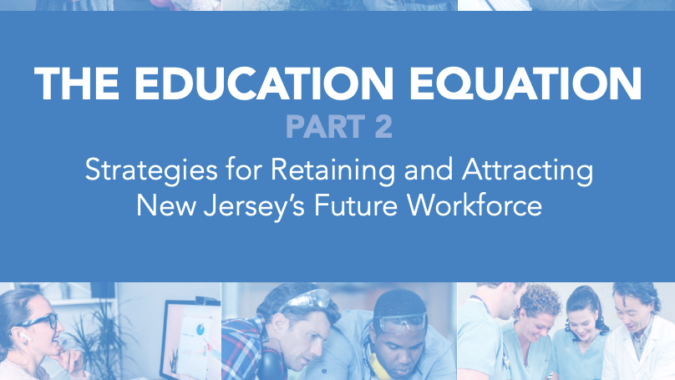A taskforce of over 100 business, academic and government experts today released “The Education Equation Part 2: Strategies to Reskill, Reshape & Rehire New Jersey’s Workforce,” a report with 18 recommendations for rebuilding the workforce in a post-pandemic economy.
Focus NJ: The Center for Economic Research & Workforce Solutions formed the Education & Workforce Development Taskforce to expand upon NJBIA’s 2018 workforce research and examine how the coronavirus pandemic has impacted efforts to educate and prepare New Jersey’s workers for the jobs of the future.
The taskforce included business and industry leaders, academic experts (K-16), county workforce development boards, nonprofit organizations, and government officials from both the executive and legislative branches.
“The taskforce’s recommendations provide the framework to reskill, reshape and rehire New Jersey at a critical time when there has been so much economic and workforce disruption from the COVID-19 pandemic,” said NJBIA President & CEO Michele Siekerka. “These challenging times demand that New Jersey prioritize strategic planning for long-term workforce solutions.”
To achieve a strong post-pandemic economic recovery with a robust workforce pipeline for the future, the report makes 18 recommendations that fall within three strategic areas: Expanding partnerships between business, academia, and government; training workers for both current and future jobs; and ensuring all New Jersey residents have equitable access to postsecondary education and workforce development opportunities.
The taskforce noted the COVID-19 pandemic has had a disproportionate impact on first-generation college students, students of color, women, minorworkers, individuals with disabilities, low-income families, and low- to middle-skill workers.
New Jersey’s community colleges, for example, experienced a 12.5% decline in enrollment in the fall of 2020 compared to 2019, a decline that was 2.4% higher than the national average during the same period.
Lower-wage earners were also most affected by pandemic-related job losses when COVID-19 began in March 2020. As of June 2021, about 60% of the jobs lost because of the pandemic were recovered, yet the state unemployment rate was 7.3%.
“Ensuring equitable opportunity for education and workforce development is key to reskilling, reshaping, and rehiring New Jersey’s workforce,” the report states.
The full report can be found here. Highlights of the taskforce’s recommendations include:
Expanding Partnerships
- Improve state-level collaboration between employers, educational institutions, and government agencies through the creation of a Workforce Development Committee under the auspices of the New Jersey Presidents’ Council, which represents community colleges and the state’s public and private four-year colleges and universities.
- Create strategic partnerships between the new Workforce Development Committee and the various county workforce development boards in New Jersey to increase communication and collaboration on workforce development issues.
Train for Today’s Jobs and Tomorrow’s
- Use predictive analytics to identify emerging industries and modify both credit and non-credit curricula to accurately reflect the skill sets needed for jobs in the Garden State.
- Create continuing education courses in emerging industries for K-12 teachers, who are required to earn at least 20 hours of professional development each year.
- Increase career pathway awareness through activities such as “career planning seminars” in middle school and early high school to introduce students to career pathways and accompanying educational requirements.
- Enhance business volunteer and mentorship programs in K-12 classrooms.
- Develop an industry-recognized, coordinated, and standardized roadmap for credentialing and certifications that clearly outlines pathways to degree programs.
- Create a “Career Awareness and Readiness” campaign to expand recognition of the value of all types of higher education and career pathway options, including on-ramps to credentials, degrees, and professional development.
- Create a “Back to Work” public messaging campaign promoting the safe return to work and upskilling/reskilling opportunities for displaced and unemployed workers.
- Expand corporation business tax and gross income tax credits to include businesses that invest in employee workforce development training.
Ensure Equitable Access to Education & Workforce Development Opportunities
- Improve underachieving school districts.
- Advocate to New Jersey’s congressional delegation for the expansion of federal Pell Grants to noncredit learners and graduate students.
- Enact legislation to expand eligibility for financial aid from New Jersey’s Higher Education Student Assistance Authority (HESAA) and provide low-income students the ability to receive training grants for in-demand noncredit and/or certification programs taught by state-approved training providers.
- Invest in and expand New Jersey’s transportation systems to increase commuting options for those seeking education and workforce training.
- Create business tax credits to incentivize employers to subsidize commuting costs for employees using public transportation to get to work or to attend workforce development training or education courses.
- Ensure all New Jerseyans have reliable and consistent access to broadband, as well as IT hardware and software.
- Continue to invest in childcare, early childhood education, and universal preschool at reduced cost for low-income families.
- Enhance and promote the value of diversity, equity, and inclusion among all facets of society.
To see the status of the recommendations of the 2018 Education Equation report, click here.
About Focus NJ: The Center for Economic Research & Workforce Solutions
Focus NJ, Inc. (Focus NJ) is an independent research nonprofit conducting timely, innovative, nonpartisan economic and workforce research to support sound public policy in New Jersey.




